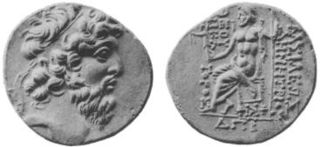Related Research Articles

The 2nd century BC started the first day of 200 BC and ended the last day of 101 BC. It is considered part of the Classical era, although depending on the region being studied, other terms may be more suitable. It is also considered to be the end of the Axial Age. In the context of the Eastern Mediterranean, it is the mid-point of the Hellenistic period.
This article concerns the period 229 BC – 220 BC.
This article concerns the period 129 BC – 120 BC.
This article concerns the period 139 BC – 130 BC.
This article concerns the period 149 BC – 140 BC.
This article concerns the period 159 BC – 150 BC.
This article concerns the period 239 BC – 230 BC.
This article concerns the period 189 BC – 180 BC.
Year 124 BC was a year of the pre-Julian Roman calendar. At the time it was known as the Year of the Consulship of Longinus and Calvinus and the Fifth Year of Yuanshuo. The denomination 124 BC for this year has been used since the early medieval period, when the Anno Domini calendar era became the prevalent method in Europe for naming years.
Year 189 BC was a year of the pre-Julian Roman calendar. At the time it was known as the Year of the Consulship of Nobilior and Vulso. The denomination 189 BC for this year has been used since the early medieval period, when the Anno Domini calendar era became the prevalent method in Europe for naming years.

Year 220 BC was a year of the pre-Julian Roman calendar. At the time it was known as the Year of the Consulship of Laevinus/Catulus and Scaevola/Philo. The denomination 220 BC for this year has been used since the early medieval period, when the Anno Domini calendar era became the prevalent method in Europe for naming years.
Year 154 BC was a year of the pre-Julian Roman calendar. At the time it was known as the Year of the Consulship of Opimius and Albinus/Glabrio. The denomination 154 BC for this year has been used since the early medieval period, when the Anno Domini calendar era became the prevalent method in Europe for naming years.
Year 159 BC was a year of the pre-Julian Roman calendar. At the time it was known as the Year of the Consulship of Dolabella and Nobilior and the Fifth Year of Houyuan. The denomination 159 BC for this year has been used since the early medieval period, when the Anno Domini calendar era became the prevalent method in Europe for naming years.
Year 223 BC was a year of the pre-Julian Roman calendar. At the time it was known as the Year of the Consulship of Flaminus and Philus. The denomination 223 BC for this year has been used since the early medieval period, when the Anno Domini calendar era became the prevalent method in Europe for naming years.

The Kingdom of Pergamon, Pergamene Kingdom, or Attalid kingdom was a Greek state during the Hellenistic period that ruled much of the Western part of Asia Minor from its capital city of Pergamon. It was ruled by the Attalid dynasty.

Attalus II Philadelphus was a ruler of the Attalid kingdom of Pergamon and the founder of the city of Attalia (Antalya).
Attalus or Attalos may refer to:
Stratonice was a princess of Cappadocia and through marriage a queen of Pergamon.

The Seleucid Dynastic Wars were a series of wars of succession that were fought between competing branches of the Seleucid royal household for control of the Seleucid Empire. Beginning as a by-product of several succession crises that arose from the reigns of Seleucus IV Philopator and his brother Antiochus IV Epiphanes in the 170s and 160s, the wars typified the final years of the empire and were an important cause of its decline as a major power in the Near East and Hellenistic world. The last war ended with the collapse of the kingdom and its annexation by the Roman Republic in 63 BC.
References
- ↑ Hung, Hing Ming (2020). The Magnificent Emperor Wu: China's Han Dynasty. pp. 123–124. ISBN 978-1628944167.
- ↑ Marvin Perry et al., eds. Western Civilization: Ideas, Politics, and Society (Cengage Learning, 2008) p135
- ↑ "Attalus II Philadelphus". Encyclopædia Britannica. February 13, 2024. Retrieved February 27, 2024.